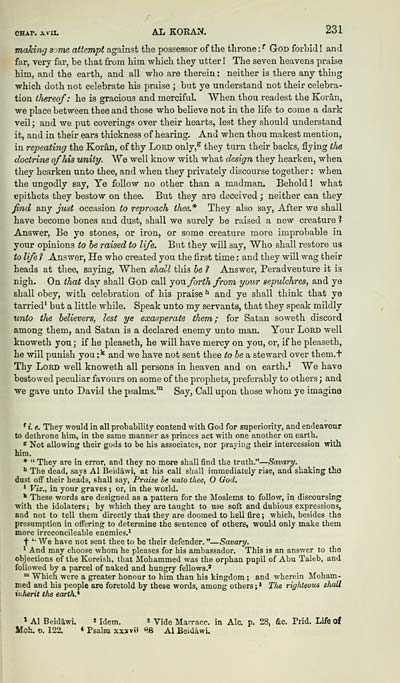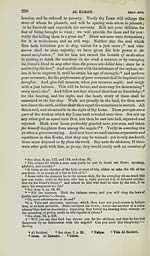Download files
Complete book:
Individual page:
Thumbnail gallery: Grid view | List view

CHAP. ivn. AL KORAN. 231
maJdng s me attempt against the possessor of the throne : ^ God forbid ! and
far, veiy far, be that from him which tliey utter ! The seven heavens praise
him, and the earth, and all who are therein : neither is there any thing
which doth not celebrate his praise ; but ye understand not their celebra-
tion thereof: he is gracious and merciful. When thou readest the Koran,
we place between thee and those who believe not in the life to come a dark
veil ; and we put coverings over their hearts, lest they should understand
it, and in their ears thickness of hearing. And when thou makest mention,
in rejyeating the Koran, of thy Lord only,^ they turn their backs, flying tlie
doctrine of his unity. "We well know with what design they hearken, when
they hearken unto thee, and when they privately discourse together : when
the ungodly say, Te follow no other than a madman. Behold ! what
epithets they bestow on thee. But they are deceived ; neither can they
find any just occasion to reproach thee* They also say, After we shall
have become bones and dust, shall we surely be raised a new creature 1
Answer, Be ye stones, or iron, or some creature more improbable in
your opinions to he raised to life. But they will say. Who shall restore us
to life 1 Answer, He who created you the first time : and they will wag their
heads at tliee, saying. When shall this be ? Answer, Peradventure it is
nigh. On that day shall God call jovi forth from your sepulchres, and ye
shall obey, with celebration of his praise ^ and ye shall think that ye
tarried' but a little while. Speak unto my servants, that they apeak mildly
unto the believers, lest ye exasperate them; for Satan soweth discord
among them, and Satan is a declared enemy unto man. Your Lord well
knoweth you; if he pleaseth, he will have mercy on you, or, if he pleaseth,
he will punish you :^ and we have not sent thee to be a steward over them.t
Thy Lord well knoweth all persons in heaven and on earth.^ We have
bestowed peculiar favours on some of the prophets, preferably to others; and
we gave unto David the psalms."* Say, Call upon those whom ye imagine
't. e. They would in all probability contend with God for superiority, and endeavour
to dethrone him, in the same manner as princes act with one another on earth.
6 Not allowing their gods to be his associates, nor praying their intercession with
him.
* " They are in error, and they no more shall find the truth." — Savary.
^ The dead, says Al Beidawi, at his call shall immediately rise, and shaking the
dust off their heads, shall say. Praise be unto thee, O God,
* Viz., in your graves ; or, in the world.
^ These words are designed as a pattern for the Moslems to follow, in discoursing
with the idolaters ; by which they are taught to use soft and dubious expressions,
and not to tell them directly that they are doomed to hell fire ; which, besides the
presumption in offering to determine the sentence of others, would only make them
more irreconcileable enemies.'-
t '• We have not sent thee to be their defender. " — Savary.
' And may choose whom he pleases for his ambassador. This is an answer to the
objections of the Koreish, that Mohammed was the orphan pupil of Abu Taleb, and
followed by a parcel of naked and hungry fellows.*
™ Which were a greater honour to him than his kingdom ; and wherein Moham-
med and his people are foretold by these words, among others ; ' The righteous shall
inherit the earth.*
^ Al Beidawi. » Idem. ' Vide Mairacc. in Ala p. 28, &c. Prid. Life of
Moh. o. 122. * Psalm xxxvii 98 Al Beidawi.
maJdng s me attempt against the possessor of the throne : ^ God forbid ! and
far, veiy far, be that from him which tliey utter ! The seven heavens praise
him, and the earth, and all who are therein : neither is there any thing
which doth not celebrate his praise ; but ye understand not their celebra-
tion thereof: he is gracious and merciful. When thou readest the Koran,
we place between thee and those who believe not in the life to come a dark
veil ; and we put coverings over their hearts, lest they should understand
it, and in their ears thickness of hearing. And when thou makest mention,
in rejyeating the Koran, of thy Lord only,^ they turn their backs, flying tlie
doctrine of his unity. "We well know with what design they hearken, when
they hearken unto thee, and when they privately discourse together : when
the ungodly say, Te follow no other than a madman. Behold ! what
epithets they bestow on thee. But they are deceived ; neither can they
find any just occasion to reproach thee* They also say, After we shall
have become bones and dust, shall we surely be raised a new creature 1
Answer, Be ye stones, or iron, or some creature more improbable in
your opinions to he raised to life. But they will say. Who shall restore us
to life 1 Answer, He who created you the first time : and they will wag their
heads at tliee, saying. When shall this be ? Answer, Peradventure it is
nigh. On that day shall God call jovi forth from your sepulchres, and ye
shall obey, with celebration of his praise ^ and ye shall think that ye
tarried' but a little while. Speak unto my servants, that they apeak mildly
unto the believers, lest ye exasperate them; for Satan soweth discord
among them, and Satan is a declared enemy unto man. Your Lord well
knoweth you; if he pleaseth, he will have mercy on you, or, if he pleaseth,
he will punish you :^ and we have not sent thee to be a steward over them.t
Thy Lord well knoweth all persons in heaven and on earth.^ We have
bestowed peculiar favours on some of the prophets, preferably to others; and
we gave unto David the psalms."* Say, Call upon those whom ye imagine
't. e. They would in all probability contend with God for superiority, and endeavour
to dethrone him, in the same manner as princes act with one another on earth.
6 Not allowing their gods to be his associates, nor praying their intercession with
him.
* " They are in error, and they no more shall find the truth." — Savary.
^ The dead, says Al Beidawi, at his call shall immediately rise, and shaking the
dust off their heads, shall say. Praise be unto thee, O God,
* Viz., in your graves ; or, in the world.
^ These words are designed as a pattern for the Moslems to follow, in discoursing
with the idolaters ; by which they are taught to use soft and dubious expressions,
and not to tell them directly that they are doomed to hell fire ; which, besides the
presumption in offering to determine the sentence of others, would only make them
more irreconcileable enemies.'-
t '• We have not sent thee to be their defender. " — Savary.
' And may choose whom he pleases for his ambassador. This is an answer to the
objections of the Koreish, that Mohammed was the orphan pupil of Abu Taleb, and
followed by a parcel of naked and hungry fellows.*
™ Which were a greater honour to him than his kingdom ; and wherein Moham-
med and his people are foretold by these words, among others ; ' The righteous shall
inherit the earth.*
^ Al Beidawi. » Idem. ' Vide Mairacc. in Ala p. 28, &c. Prid. Life of
Moh. o. 122. * Psalm xxxvii 98 Al Beidawi.
Set display mode to: Large image | Transcription
Images and transcriptions on this page, including medium image downloads, may be used under the Creative Commons Attribution 4.0 International Licence unless otherwise stated. ![]()
| Early Gaelic Book Collections > J. F. Campbell Collection > Koran: or, Alcoran of Mohammed > (385) |
|---|
| Permanent URL | https://digital.nls.uk/77138330 |
|---|
| Description | Volumes from a collection of 610 books rich in Highland folklore, Ossianic literature and other Celtic subjects. Many of the books annotated by John Francis Campbell of Islay, who assembled the collection. |
|---|
| Description | Selected items from five 'Special and Named Printed Collections'. Includes books in Gaelic and other Celtic languages, works about the Gaels, their languages, literature, culture and history. |
|---|

